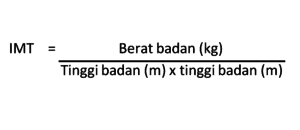Contents:
- Medical Video: Preventing Pre-Diabetes
- The relationship between weight and diabetes
- What is the ideal body weight to avoid diabetes?
- What if I have excess weight or obesity?
Medical Video: Preventing Pre-Diabetes
Excess weight is one of the risk factors for diabetes. That is, people with excess body weight are more likely to suffer from diabetes. For this reason, you need to maintain your ideal weight to reduce your risk of diabetes.
Actually, what is the relationship between weight and diabetes? Then, how much weight should be achieved to avoid diabetes? See the explanation below.
The relationship between weight and diabetes
Weight and diabetes seem to have a very close relationship. People who are overweight or obese have a higher risk (up to 20-40 times) for diabetes than people who have a normal body weight. In fact, obesity is the number one risk factor for diabetes, quoted from WebMD.
So, it's no wonder that around 90% of people with diabetes mellitus (the most common diabetes) are people who have excess weight or obesity, according to a report from Harvard Health. Why can obesity cause diabetes?
This is because obesity can cause changes in the body's metabolism which results in cells not being able to respond to insulin properly. This makes the body less sensitive to insulin, resulting in insulin resistance, which then results in diabetes. A study from Harvard University also proved that obesity can cause stress in the endoplasmic reticulum (RE), which can lead to insulin resistance.
So, if you have excess weight, losing weight is the best way to reduce your risk of diabetes. Losing weight 7-10% of your current body weight can reduce the risk of type 2 diabetes mellitus by 50%.
What is the ideal body weight to avoid diabetes?
Maybe you are wondering, how much ideal should you have if you want to avoid diabetes? Actually, the ideal body weight of each person is different. This depends on the height that you have.
To reduce the risk of diabetes, you are only in the range of normal weight, no overweight or obesity. To find out whether your weight is normal or not, you can check it by calculating the Body Mass Index (BMI).
Calculate your BMI with this formula:

- <18.5 = less weight
- 18,5 - 24,9 = normal body weight
- 25 - 29.9 = excess weight (overweight)
- ≥30 = obesity
What if I have excess weight or obesity?
If you have excess weight or are obese, you should lower your weight from now to normal. This makes you less at risk for insulin resistance, so it also lowers your risk of diabetes.
Two important things you must do to lose weight in a healthy manner is to maintain a regular diet and exercise.
In maintaining a diet, consider the portion and selection of food. Take just enough food, not too much to make you too full. Choose healthy foods, such as multiplying vegetables and fruits. As much as possible limit the consumption of foods that contain high calories and fat. Especially those that contain saturated fats and trans fats, such as fried foods.
Also limit consumption of sweet foods and drinks. You can use low-calorie and sugar-free sweeteners to control calorie intake and prevent diabetes. Setting your meal time is also needed so that your appetite is always controlled, preventing you from overeating.
Regular exercise need to be done to compensate for the calories that come from food, so that weight can go down. In addition, regular exercise can also help the body respond to insulin properly, so that diabetes can be prevented. Do exercise for at least 30 minutes per day or 150 minutes per week. You can start doing sports from the light ones first, like walking, running, swimming, cycling, and so on. But remember, do it regularly!












